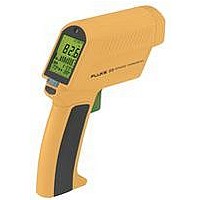FLUKE-574NI Fluke, FLUKE-574NI Datasheet - Page 2

FLUKE-574NI
Manufacturer Part Number
FLUKE-574NI
Description
INFRARED THERMOMETER, -30°C TO 900°C
Manufacturer
Fluke
Datasheet
1.FLUKE-572.pdf
(4 pages)
Specifications of FLUKE-574NI
Temperature Measuring Range
-30°C To 900°C (-25°F To 1600°F)
Temperature Tester Type
Thermometer - Infrared
Accuracy %
0.75%
Lead Free Status / RoHS Status
na
574-NI Nonincendive
Model
When safety is a concern and
data logging and downloading
are required, the Fluke 574
Nonincendive (NI) model
thermometer is the product to
choose. It has the same great
features as the standard 574
model thermometers with the
extra confidence of a Factory
Mutual approval for use in
hazardous environments*.
The Fluke 574-NI thermometer,
does not to release enough electrical or thermal energy to
ignite flammable gases or vapors under normal operational and
environmental conditions.
*See specification table for details.
Close Focus Option
The Close Focus (CF) option lets you accurately measure very
small areas at the focus point – where the IR beam narrows.
Paired with the advanced coaxial laser sighting system,
extremely small objects 6 mm (0.24 in) at 300 mm (11.4 in)
can be easily measured. Ideal for electrical maintenance and
refrigeration troubleshooting.
Advanced Display
•
•
•
•
100-point onboard temperature
data logging capability
30 preset common material
emissivity values
Adjustable emissivity values
(0.01 increments)
Customizable log names, alarms,
and emissivity
Advanced Sighting
Accurate measurements depend in part on
accurately sighting a target. Fluke 570 series
thermometers are the only thermometers with
a sighting system designed to precisely track
the infrared path as seen by the sensors. This
enables the advanced coaxial three-dot laser
sighting to accurately show both the center
and the edges of the spot being measured,
regardless of the thermometer’s distance from
the target.
bright to the human eye as normal lasers
(while maintaining the same safety rating as
less bright lasers), making precise sighting
easier in a variety of lighting conditions and
distances.
This laser sighting also appears twice as



